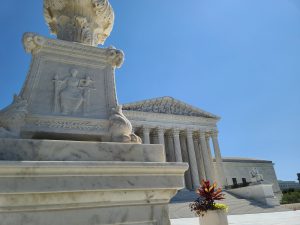The prosecution laid down a strong hand in its case against Hunter Biden over illegal gun possession in court this week, but the President’s son may have an ace up his sleeve.
In evidence ranging from Hunter’s own description of his drug addiction from around the time period of his October 2018 gun purchase in his autobiography to his conversations about doing drugs he had with his daughter and ex-girlfriends to drug residue being found on the leather pouch he kept his gun in, the government went a long way in establishing that Biden was addicted to drugs when he bought the revolver. That’s a key point of contention in the case since all of the charges center on Biden’s status as an active drug addict. Convincing the jury that Biden acquired his firearm during a relatively brief window when he was no longer using is going to be the primary task for the defense team when their arguments begin on Monday.
That’s looking like a tall task, but a new filing on Friday reveals a backup plan that may fare better: claiming the prohibition on drug users owning guns violates the Second Amendment.
Now, this defense is also something of a longshot because most judges who’ve heard challenges to the federal prohibition on drug users possessing guns have upheld the restriction. For instance, Federal District Judge C.J. Williams recently found the ban stands even under the history and tradition test established by the Supreme Court in New York State Rifle and Pistol Association v. Bruen.
“[U]nder the more robust historic analysis demanded by Bruen, the Court is persuaded that Section 922(g)(3) withstands a constitutional attack,” Judge Williams wrote. “Congress made it illegal for unlawful drug users to possess firearms for the common sense and obvious reason that someone using illegal drugs, in possession of a firearm, poses a real danger to the community.”
Citing 2010’s United States v. Yancey, he found chronic drug users are a similar threat to society as the dangerously mentally ill because they lack self-control.
“It follows, then, that barring unlawful drug users who pose a danger to society is consistent with the history of firearm regulation at the time the Second Amendment was adopted,” he wrote.
But there is a growing body of case law that backs up Hunter’s contention that the lifetime ban on drug users owning guns is unconstitutional–at least in some circumstances. In US v. Daniels, a federal appellate panel found violence was a key component to disarming even drug users during the Founding Era.
“In short, our history and tradition may support some limits on an intoxicated person’s right to carry a weapon, but it does not justify disarming a sober citizen based exclusively on his past drug usage,” Fifth Circuit Judge Jerry E. Smith, a Ronald Reagan appointee, wrote for a unanimous panel. “Nor do more generalized traditions of disarming dangerous persons support this restriction on nonviolent drug users.”
In US v. Veasley, another federal court came to the same conclusion.
“For drinkers, the focus was on the use of a firearm, not its possession. And the few restrictions that existed during colonial times were temporary and narrow in scope,” Eighth Circuit Judge David Stras wrote, rejecting a facial challenge to the statute. “Disarmament, on the other hand, was not an option. There was even less regulation when it came to drugs.”
While many of the early cases that have invalidated charges on gun possession by drug users have centered around marijuana, a Ninth Circuit panel recently invalidated charges against somebody who police caught with cocaine.
“As for Duarte’s remaining convictions—drug possession and evading a peace officer—we do not know whether either crime traces back to an analogous, Founding-era predecessor because the Government failed to proffer that evidence,” it wrote in US v. Duarte. “Based on this record, we cannot say that Duarte’s predicate offenses were, by Founding era standards, of a nature serious enough to justify permanently depriving him of his fundamental Second Amendment rights.”
The panel noted there likely aren’t historical analogues for disarming drug users because drug use itself wasn’t criminalized during the Founding Era.
“Criminalizing drug possession, in particular, did not appear to gain significant momentum until the early 20th century, with the passage of such laws as the Food and Drug Act of 1906 and the Harrison Narcotics Tax Act of 1914,” the panel wrote in a footnote. “Before then, what we now think of as ‘illicit drugs,’ such as opium and cocaine, ‘were . . . legal in the United States’ for a long stretch of this country’s history.”
So, it’s probably a more straightforward argument to make than one that relies on a jury believing a few short weeks of claimed sobriety puts Hunter outside the addict designation under the law.
Additionally, while the judge denied Biden’s initial facial challenge to the federal law prohibiting drug users from possessing guns, his new request for acquittal on Second Amendment grounds narrowed the claim to how prosecutors applied the law in his case. That lowers the bar for success since Hunter’s lawyers now just have to prove the charges against him, in particular, are unconstitutional rather than every conceivable charge against anyone under the law in dispute. They plan on doing that by emphasizing the younger Biden’s lack of a violent record or even accusations he had any plans to use the gun in an offensive manner.
“[T]here is no evidence that Mr. Biden is violent or has any history of violence,” Biden’s brief reads. “In fact, all the evidence that the government admitted failed to show the gun was ever loaded or used and the bullets (save for two Ms. Biden said she did something with) confirms [SIC] that fact.”
Biden’s lawyers pointed to the dangerousness standard established in Daniels as reason to believe the charges violate his Second Amendment rights.
“Daniels makes clear that, at a minimum, there would have to be an actual danger posed from active drug use and physical possession, and not just some prediction of future dangerousness based on regular drug use and the ability to take physical possession of a gun,” they wrote. “The exception the Special Counsel hopes to invoke focused on ‘the misuse of weapons while intoxicated,’ but there is no possible misuse of a weapon by an intoxicated person who owns a gun that is not in his physical possession.”
His lawyers doubled down on that point, saying the government itself had shown Biden wasn’t dangerous–especially during the time he owned the gun. In fact, they noted there wasn’t evidence he’d ever fired the gun or informed anybody else he’d even bought it.
“Nobody testified that Mr. Biden ever showed the weapon to anyone, much less brandished the weapon in any threatening or offensive manner,” Biden’s brief reads. “Again, the government’s evidence more than suggests it was never loaded or fired the weapon. The only witnesses to even see the gun after Mr. Biden bought it and left with it in its own case were Ms. Biden who was the one who took it from a compartment and brought it into public (and threw in [SIC] a trashcan), Edwards Banner who also took the gun he found and carried it in public, and then Lt. Millard Greer who recovered the gun. Mr. Biden was not even present on any of these instances, so he could not have used the gun in a threatening or offensive manner.”
Still, these arguments may well fail to convince the judge in Hunter Biden’s case. She previously dismissed his claim the law was unconstitutional on its face without engaging in the kind of historical analysis required under Bruen. It’s possible that could happen again with the more narrow as-applied challenge. Or the judge could do the analysis and still find the charges against Hunter constitutional.
But, given how the facts of the case have unfolded thus far, the Second Amendment may end up as Hunter Biden’s best hope.






